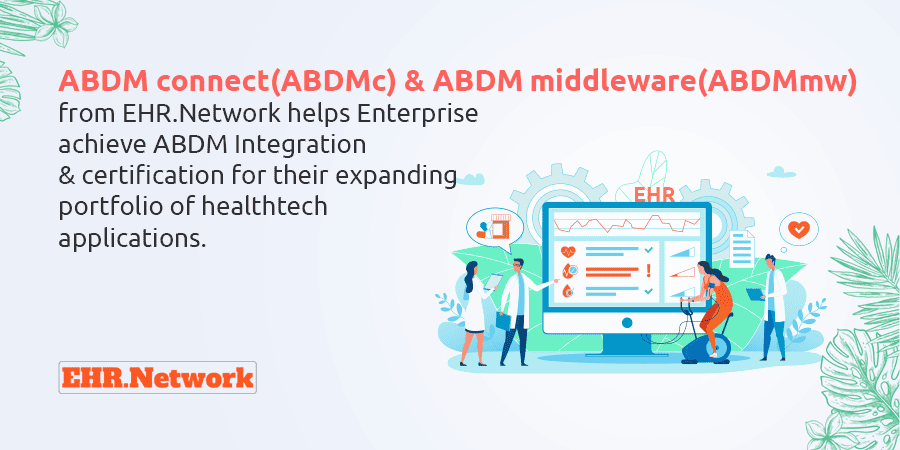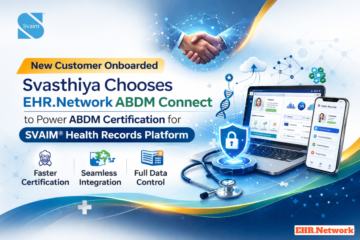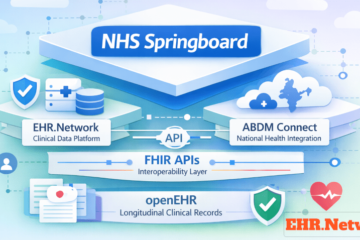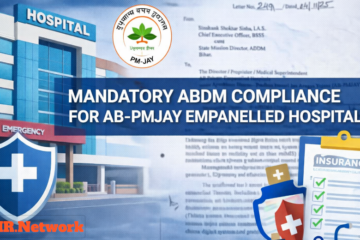✅ Case Study: Seamless Enterprise-Level ABDM Integration Using EHR.Network’s ABDMc & ABDMmw

Client Profile
A fast-growing digital healthcare enterprise serving the Indian market, with a rapidly expanding portfolio of standalone healthtech applications across diagnostics, clinical workflows, and patient engagement.
🧩 Challenge
As part of its digital health roadmap, the enterprise aimed to achieve Ayushman Bharat Digital Mission (ABDM) certification and compliance across all applications. However, the portfolio comprised multiple siloed applications, each with unique data models and workflows.
Key challenges included:
- Ensuring Enterprise-Level ABDM Integration without disrupting existing application functionality
- Achieving enterprise-wide ABHA, HIP, and HIU integration
- Managing data silos while preserving architecture autonomy
- Avoiding major re-engineering of individual systems
🎯 Objective
To implement a unified ABDM integration strategy across all applications with:
- Minimal impact on current systems
- Scalable architecture for future expansion
- End-to-end support for M1 and M2 certification milestones
💡 Solution: ABDM Middleware Integrated Mode by EHR.Network
The enterprise deployed EHR.Network’s ABDM Connect (ABDMc) alongside ABDM Middleware (ABDMmw) in the ABDM Middleware Integrated Mode—a deployment model purpose-built for multi-application environments.
Key Components:
- ABDMc: Interface layer for secure interaction with the ABDM network (e.g., consent, ABHA workflows, FHIR bundle creation)
- ABDMmw: Middleware-based unified data layer that aggregates, normalizes, and structures clinical data across apps for ABDM sharing
🔍 Implementation Overview
✅ Milestone 1 (M1): ABHA Creation and Profile Management
- ABHA numbers and addresses generated centrally via ABDMc
- ABHA profiles stored in a central FHIR repository within ABDMmw
- Eliminated duplicate profile creation across applications
- Ensured enterprise-wide identity consistency
✅ Milestone 2 (M2): HIP Functionality and Data Sharing
- Applications pushed clinical data to ABDMmw using policy-driven mechanisms
- CareContexts and EHR records structured within ABDMmw
- ABDMc managed consent gathering, encryption, and FHIR bundle submission
- Applications required no direct handling of ABDM APIs or workflows
🔧 Architecture Highlights
- Hybrid repository model combining:
- FHIR for ABDM-compliant interoperability
- openEHR for structured, future-ready clinical data
- Zero modifications to existing health applications
- Centralized logging, auditing, and consent management
✅ Results & Benefits
| Benefit | Description |
|---|---|
| Unified Integration | Enabled a single, consistent interface for ABDM across all applications |
| Zero Workflow Disruption | No changes needed in existing application logic or data structures |
| Data Layer Decoupling | Robust, policy-driven data ingestion and transformation handled via middleware |
| Scalable Compliance | Rapid M1 and M2 certification, WASA onboarding initiated |
| Data-First Future | Middleware architecture lays foundation for transitioning to EHR.Network’s Data-First Health Platform |
| Expert Partner Support | EHR.Network provided end-to-end assistance for ABDM integration and functional certification |
📈 Impact
With ABDMc and ABDMmw, the client enterprise:
- Reduced ABDM integration time from months to weeks
- Protected internal development roadmaps by externalizing compliance logic
- Positioned itself to scale future applications with built-in ABDM readiness
- Demonstrated leadership in national digital health compliance and interoperability
🚀 Next Steps
The enterprise now plans to:
- Extend integration to Milestone 3 (M3) and PHR functionalities
- Upgrade its ABDMmw instance into a full-fledged, standards-compliant clinical data platform
- Use ABDM-certified infrastructure to build next-generation digital health applications
🔗 Explore More
- 👉 ABDMc – Unified ABDM APIs
- 👉 ABDMmw – Middleware for Standards Compliance
- 📝 Get our help on ABDM Certification
- 📅 Book a call to discuss more



0 Comments